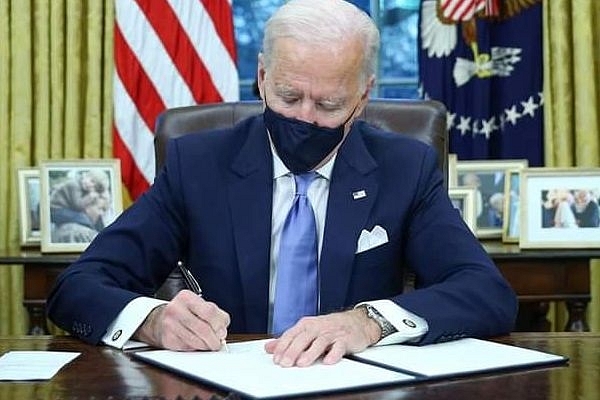Insta
US To Focus On China's Growing Nuclear Arsenal As It Extends Last Remaining Nuclear Arms Control Treaty With Russia

46th United States president Joe Biden (Source: Twitter)
The US on Wednesday (3 February) extended the New Strategic Arms Reduction Treaty (New START) with Russia for five years, said US Secretary of State Antony Blinken.
"Extending the New START Treaty ensures we have verifiable limits on Russian ICBMs, SLBMs, and heavy bombers until February 5, 2026," said Blinken, adding that the extension "makes the United States, US allies and partners, and the world safer", Xinhua news agency reported.
"Especially during times of tension, verifiable limits on Russia's intercontinental-range nuclear weapons are vitally important," he said.
Blinken noted that Washington would use the five-year extension period to seek arms control with Moscow that addresses all of the Russian nuclear weapons.
The US Secretary of State said that America will also pursue "arms control to reduce the dangers from China’s modern and growing nuclear arsenal".
The New START, which limits the numbers of deployed strategic nuclear warheads to 1,550 and delivery systems to 700 for each, is the last remaining nuclear arms control pact in force between the two nuclear superpowers.
The treaty can be extended by a maximum of five years with the consent of the two countries.
The former Donald Trump-led administration tried to conclude a shorter extension of the treaty last year after rounds of negotiation with Russia, but the two sides failed to finalize a formal agreement.
Immediately after taking office, President Joe Biden proposed a full five-year extension of the treaty that expires on 5 February, a move welcomed by the Kremlin.
Russian President Vladimir Putin last Friday signed a bill into law ratifying a five-year extension of the New START with the United States.
The extension of the New START might be a bright spot for the US-Russia relations, but the overall tensions between Washington and Moscow are unlikely to decrease given their differences on issues of human rights, Ukraine, cybersecurity as well as their mutual accusation of interference in the domestic politics.
"Even as we work with Russia to advance U.S. interests, so too will we work to hold Russia to account for adversarial actions as well as its human rights abuses, in close coordination with our allies and partners," Blinken said.
(With inputs from IANS)
Introducing ElectionsHQ + 50 Ground Reports Project
The 2024 elections might seem easy to guess, but there are some important questions that shouldn't be missed.
Do freebies still sway voters? Do people prioritise infrastructure when voting? How will Punjab vote?
The answers to these questions provide great insights into where we, as a country, are headed in the years to come.
Swarajya is starting a project with an aim to do 50 solid ground stories and a smart commentary service on WhatsApp, a one-of-a-kind. We'd love your support during this election season.
Click below to contribute.
Latest